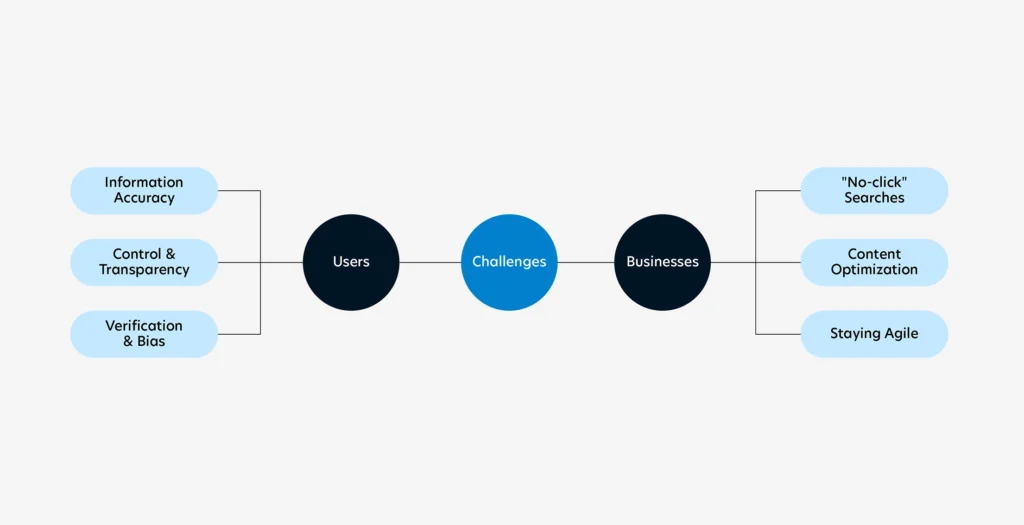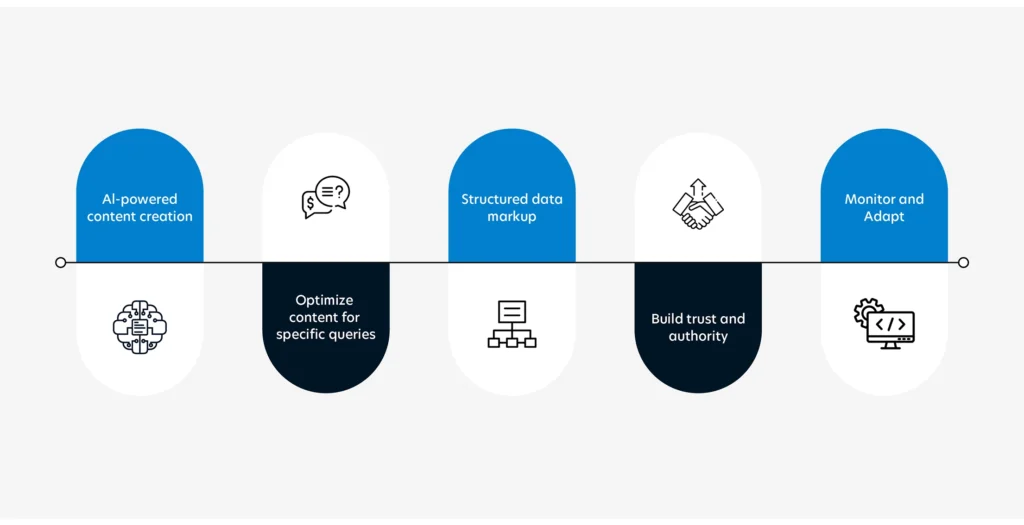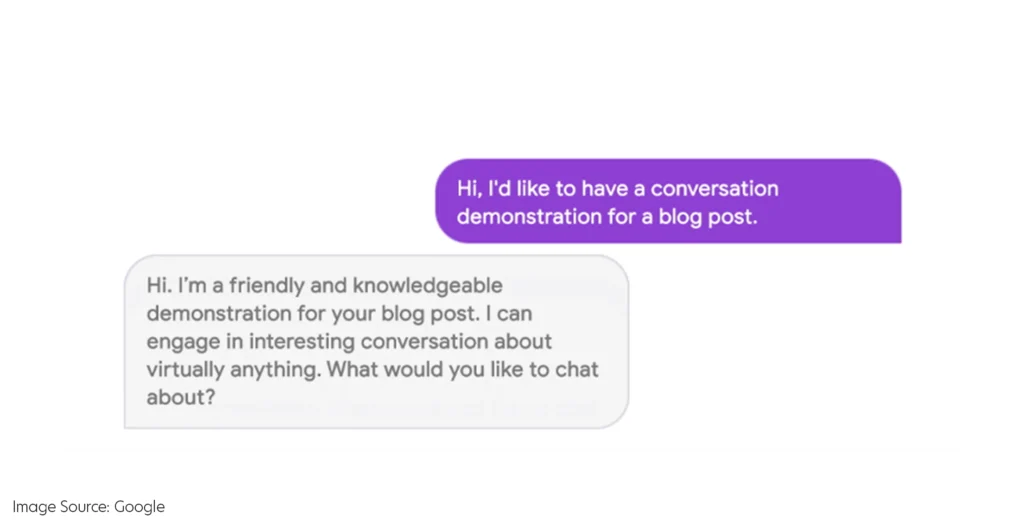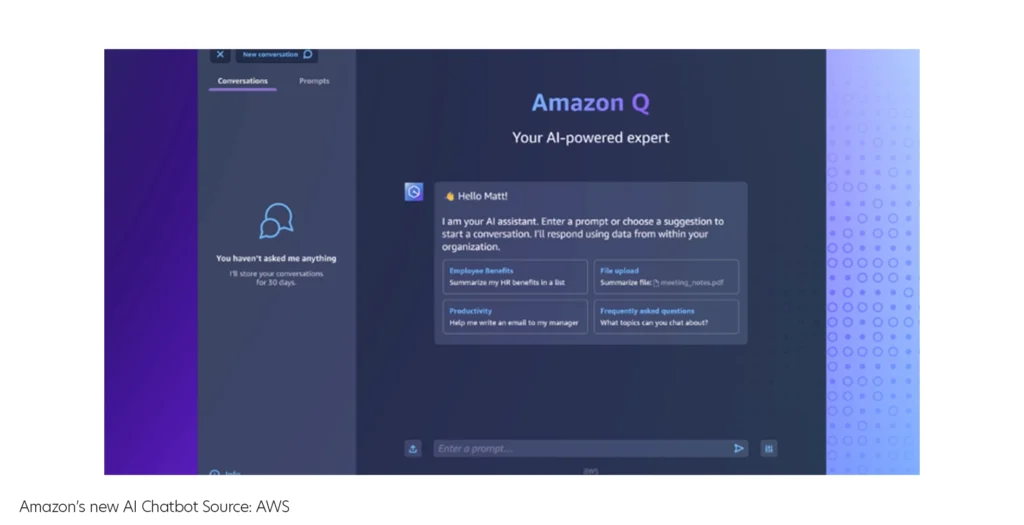“Google’s Search Generative Experience isn’t a replacement, it’s an revolution”
In the fast-paced digital era, where information is abundant and attention spans are shrinking, the way we search for and consume information has undergone a significant transformation. Legacy search engines, once reliant on keyword matching and algorithmic precision, are now being revolutionized by the emergence of Search Generative Experience (SGE) approach powered by generative AI that promises to reshape how we interact with the web.
This groundbreaking approach not only enhances user experience but also holds immense potential for businesses seeking to optimize their online presence.
The Evolution of Search

Legacy search engines have been primarily keyword-driven, relying on algorithms that match user queries with indexed content. While effective to a certain extent, these systems often struggle with providing relevant results in complex or ambiguous contexts. Additionally, the user experience may be hindered by a lack of personalization, limited understanding of user intent, and the nuances of human language. Users often had to fine-tune their queries to obtain relevant results.
The makeover of search generative experiences addresses these challenges by incorporating advanced machine learning techniques, natural language processing (NLP), and contextual understanding. This evolution not only enhances the user experience but also has a profound impact on businesses across various sectors.
What is Google's Search Generative Experience (SGE)?
Google’s Search Generative Experience is a pioneering experiment in the realm of search, leveraging generative AI to deliver contextual answers to complex user queries. Built on Google’s Shopping Graph, which is acclaimed as the world’s most comprehensive dataset of continuously updated product information, SGE signifies a departure from traditional keyword-based searches towards a more conversational, interactive, and personalized search encounter. Available as an early-stage experiment in Google’s Search Labs, SGE embodies Google’s commitment to pushing the boundaries of search capabilities and user experiences.
The integration of generative AI enables SGE to comprehend natural language queries, decipher user intent, and generate dynamic, contextually relevant responses. This shift towards conversational search interactions is underpinned by Google’s rich knowledge graph and AI capabilities, empowering SGE to curate multimedia-enriched results tailored to the specific needs and preferences of individual users.
The Ripple Effect: Challenges for Businesses and Users in adapting to the SGE Landscape

Businesses need to adapt their content strategy to cater to the new search landscape, ensuring their information is readily accessible and interpretable by AI algorithms. Additionally, potential concerns around information accuracy and potential bias within AI-generated summaries need to be addressed.
For users, navigating the new interface and discerning the trustworthiness of AI-generated content requires a certain level of digital literacy and critical thinking skills.
A New Frontier: The Impact of SGE on Businesses and Users
The potential impact of SGE is far-reaching, affecting how businesses and users interact with the digital world. Here’s a closer look:
For User Experience:
- Enhanced Relevance and Personalization: Search generative experiences leverage advanced algorithms to understand user intent and context, delivering more relevant and personalized results.
For example, Google’s BERT (Bidirectional Encoder Representations from Transformers) algorithm enables the search engine to understand the context of words in a query, leading to more accurate results. - Voice Search Revolution: The rise of voice search, powered by technologies like Amazon’s Alexa, Google Assistant, and Apple’s Siri, has transformed how users interact with search engines. Businesses need to optimize their online presence to align with voice search queries, emphasizing the importance of conversational content.
- Visual Search and Augmented Reality (AR): Visual search capabilities, as seen in platforms like Pinterest and Google Lens, allow users to search using images instead of text. Augmented Reality further enhances the user experience by providing immersive, context-aware information. Businesses can leverage these technologies to showcase products in innovative ways and facilitate seamless customer experience.
For Businesses:
- Improved Customer Engagement: Businesses can now engage customers more effectively by tailoring their online presence to match the evolving search behavior. Understanding user intent enables companies to provide relevant content, improving customer satisfaction and retention.
- Data-Driven Decision Making: The new search generative experiences generate vast amounts of data about user behavior and preferences. Businesses can harness this data to make informed decisions, refine marketing strategies, and enhance product offerings based on real-time insights.
- Competitive Advantage: Early adoption of advanced search technologies can provide a competitive edge. Businesses that leverage the latest SGE position themselves as innovators, attracting tech-savvy customers and staying ahead of competitors who are slow to adapt.
- Improved SEO Strategies: Businesses need to adapt their SEO strategies to align with SGE, focusing on creating content that answers user queries in a conversational manner. Long-tail keywords and content that addresses specific user needs become crucial for visibility in SGE-driven search results.
Preparing for the SGE Era: A Roadmap for Businesses
So, how can your businesses be prepared? Here’s a roadmap:

- Embrace AI-powered content creation: Explore tools and services that can help create high-quality, informative content that aligns with SGE’s requirements.
- Optimize content for specific queries: Identify relevant search queries and optimize content to answer those queries directly and concisely.
- Leverage structured data markup: Implement Schema markup to provide search engines with additional information about your content, making it easier for SGE to understand and present it effectively.
- Focus on building trust and authority: Establish your brand as a reliable source of information by creating well-researched, accurate, and trustworthy content.
- Monitor and adapt: Stay updated on the latest developments in SGE and adapt your strategies accordingly.
Generative Search in Action
Several companies are already exploring the potential of generative experiences:
- Google AI’s LaMDA: This generative language model can engage in conversations, answer complex questions, and generate different creative text formats, potentially revolutionizing search interactions.

- Amazon “Q”: This large language model can summarize factual topics and create different kinds of creative text formats, potentially enhancing product search experiences by providing personalized recommendations and engaging product descriptions.

Bottom Line
“Change is the new normal”
The transformation brought about by search generative experiences signifies a paradigm shift in the way businesses and users interact with information. While challenges exist, the potential benefits are too significant to ignore.
As businesses prepare for this transformative journey, strategic planning and technological readiness become paramount. Investing in skilled AI professionals, fostering a culture of innovation, and implementing robust data security measures are imperative steps. Collaboration with technology partners and leveraging cloud-based solutions can also expedite the integration process.
Quinnox stands at the forefront of adopting these changes. With a commitment to innovation, proactive approach to emerging technologies, the emphasis on upskilling our workforce and investing in cutting-edge technologies helps us navigate the challenges and harnessing the opportunities presented by the evolving search landscape.
The future of search is generative, and those who adapt early will undoubtedly reap the rewards of a more efficient, personalized, and engaging digital experience.
References:
- https://econsultancy.com/will-sge-transform-web-search/
- https://www.forbes.com/sites/johnhall/2024/01/19/how-googles-search-generative-experience-will-change-digital-marketing/?sh=43b745731913
- https://www.nwsdigital.com/Blog/Will-Googles-Search-Generative-Experience-Change-the-Way-We-Search
- https://rockcontent.com/blog/search-generative-experience/
- https://www.livemint.com/news/amazon-joins-generative-ai-race-targets-cloud-customers-11681406805743.html
- https://digitalscholar.in/google-search-generative-experience-guide/